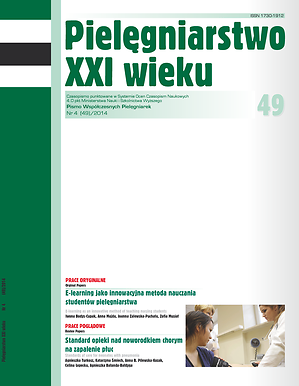Women’s attitude towards pregnancy versus chosen obstetrical factors
Keywords:
pregnancy, attitude towards pregnancy, obstetrical factorsAbstract
Introduction. Pregnancy is a special period in women’s life. It composes very complex phenomenon where changes appear, not only physiological, but also psychical. Attitude towards pregnancy is an essential aspect of the preparation to conscious parenthood and also the factor which can affect the course of pregnancy.
Aim. The aim of the thesis was attempt to show if the chosen obstetrical factors have influence on women’s attitude towards pregnancy.
Material and methods. Research was conducted in March and April 2014 in an Independent Public Clinical Hospital number 4 and in Provincial Specialist Hospital named by cardinal Stefan Wyszynski in obstetrical – neonatal ward. The research sample amounted 161 maternity both after natural labour and after caesarean section. The surveys questionnaire made by own authorship was used in the research and the test appraising the women’s attitude to arisen pregnancy by Łepecka-Klusek. To appraise the connection between variables RHO Correlation Test by Spearman was applied. To compare two tested groups there was used t-Student Test, but the compares of three or more groups was made by ANOVA variance s analysis.
Results. In the tested population the vast majority of women (155; 96,3%) had positive attitude to pregnancy, only few women (6; 3,7%) had negative. The research showed that the more positive attitude to pregnancy was the more often it proceeded correctly. No statistically essential correlations between the tested feature and the frequency of planned pregnancies were observed. However, there was observed one statistically negative poor correlation between the attitude towards pregnancy and the frequency of complications (threatening the miscarriage or diabetes) and the length of hospitalization during pregnancy. The results proved that the time of termination of pregnancy essentially differentiates the level of women’s attitude towards pregnancy (F(2, 157) = 9,28; p = 0,001).
Conclusions.
1. Chosen obstetrical factors such as: proper duration of pregnancy, some complications (threatening of miscarriage or diabetes) and the length of hospitalization have in important influence on the women’s attitude towards pregnancy, on the other hand planning pregnancy or not seen to have little meaning.
2. Women’s attitude towards pregnancy essentially conditions the time of its duration –women with negative attitude much oftener give birth earlier.
References
1. Bucholc M, Oleszczuk J, Wiktor H. The course of pregnancy in women with premature outcome. Arch Perinatal Med. 2010; 16(1): 32-35.
2. Chrzan-Dętkoś M. Psychodynamiczne rozumienie macierzyństwa – implikacje dla pracy klinicznej. Psychoterapia. 2010; 1: 5-14.
3. Łepecka-Klusek C, Jakiel G. The socio-economic conditioning of difficulties in adaptation to pregnancy following assisted reproductive techniques. Eur J Obstet Gynecol Reprod Biol. 2009; 143 (1): 50-54.
4. Smith J, Drewe Ferguson D, Guillermo Jauregui G, et al. Short-term maternal psychological stress in the post-conception period in ewes affects fetal growth and gestation length, Reproduccion. 2008; 136: 259-265.
5. Martini J, Knappe S, Beesdo-Baum K. Anxiety disorders before birth and self-perceived distress during pregnancy. Associations with maternal depression and obstetric, neonatal and early childhood outcomes. Early Hum Dev. 2010, 86: 305-310.
6. Ross LE, McLean LM. Anxiety disorders during pregnancy and the postpartum period: a systematic review. J Clin Psychiatry. 2006; 67; 1285-1298.
7. Fredrickson BL. The role of positive emotions in positive psychology: The broaden-and-build theory of positive emotions. Am Psychol. 2001; 56 (3): 218–226.
8. Parcless DA. Womens mental health nursing: depression, anxiety and stress during pregnancy. J Psychosoc Nurs Ment Health Serv. 2010; 17: 813-820.
9. Bustan MN, Coker A. Maternal attitude toward pregnancy and the risk of neonatal death. Am J Public Health. 1994; 84(3): 411-414.
10. Hobel CJ, Goldstein A, Barrett ES. Psychosocial stress and pregnancy outcome. Clin Obstet Gynecol. 2008; 51: 333-348.
11. Kornas-Biela D. Kształtowanie się przywiązania matki i dziecka w prenatalnym okresie jego rozwoju. [w:] Biela A, Wałęsa C red. Problemy współczesnej psychologii. Polskie Towarzystwo Psychologiczne. Lublin, 1992.
12. Field T, Diego M, Hernandez-Reif M. Comorbid depression and anxiety effects on pregnancy and neonatal outcome. Infant Behav Dev. 2010; 33(1): 23-29.
13. Syty K, Pilewska-Kozak A, Jakiel G. Reakcje kobiet i ich partnerów na fakt zaistnienia ciąży. Perinatol Neonatol Ginekol. 2008; 3 (1): 217-221.
14. Andersson L, Sundstrom-Poroma I, Wulff M. Impliations of antenatal depression and anxiety for obstetric outcome. Obstet Gynecol. 2004; 104: 467-476.
15. Dunkel-Schetter C, Tanner L. Anxiety, depression and stress in pregnancy: implications for mothers, children, research and practice. Psychiatry. 2012; 2 (25): 141-148.
16. Heimstad R, Dahloe R, Laache I. Fear of childbirth and history of abuse: implications for pregnancy and delivery. Acta Obstet Gynecol Scand. 2006; 85: 435-440.
Downloads
Published
Issue
Section
License
Copyright (c) 2014 Authors

This work is licensed under a Creative Commons Attribution 4.0 International License.




